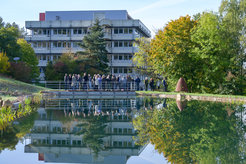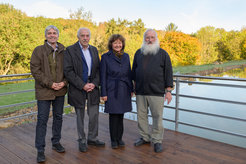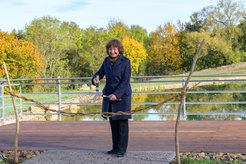A small Noah's ark
BioDiversum at the Max Planck Institute for Biophysical Chemistry inaugurated
Three years have passed since a spontaneous idea provided the impetus for the biotope project BioDiversum. With this project, the Max Planck Institute (MPI) for Biophysical Chemistry in Göttingen wants to provide habitats for endangered animal and plant species. On October 18, the BioDiversum was finally inaugurated. Guest of honor was the well-known ornithologist and conservationist Peter Berthold, who despite his old age never tires of promoting his heartfelt mission: a conservation concept that works even in our intensely used and spoiled environment.
On this cool, golden October morning, project members and guests of honor are gathered at the newly created pond, the BioDiversum’s centerpiece. They have come to attend the long-awaited inauguration and are soon deep in conversation about the topic that is so dear to all: nature conservation and what we can do to help.
“With the BioDiversum, we want to create a little piece of an ‘ideal world’ in southern Lower Saxony,” explains project initiator Herbert Jäckle, emeritus director at the MPI for Biophysical Chemistry during his speech. Managing Director Marina Rodnina adds: “We would like to help implement a fantastic idea by Peter Berthold: a biotope for every community.”

Species extinction threatens our survival
For years, the Max Planck emeritus director has been passionately propagating such a country-wide network of small biotopes. He estimates that 2,500 of them are required to ensure that species can spread among them. Berthold is convinced that this might bring biodiversity to the level of 1950 just a few decades.
“Without biodiversity in the countryside, the human race has no chance to survive in the long run,” he emphasizes in his address while the sun is slowly rising above the treetops, bathing forest and pond in its light. “We must now conserve the remnants of nature in small areas. From these Noah’s arks, a diverse nature can develop again one day.”
Berthold has already shown that his plan might work: A biotope network at Lake Constance, which he started together with the Heinz Sielmann Foundation in 2004, exceeded all expectations. Breeding populations of numerous endangered bird species recovered within a few years, and even heavily impaired areas turned into species-rich habitats.


Diverse habitat mosaic
In 2019, together with Berthold the Göttingen institute developed initial ideas for ecologically redesigning the institute’s grounds. The result is a diverse habitat mosaic, says the responsible landscaper Ulrich Küneke of the Göttingen firm Wette+Küneke:
“In addition to the pond – which is the central measure – we have created more than 1.5 hectares of flowering meadows. We widened hedges, put up a large bird feeder and 100 nesting boxes, greened facades, and established a dry site with wild perennials and flowering shrubs.” Still to follow this year are shrubs by the pond and a meadow orchard. However, the project will not be completed then. In the near future, the institute plans to ecologically enhance the flower beds along the buildings and incorporate biodiversity aspects when planning new construction.
The majority of the construction work for the BioDiversum is financed by the Max Planck Society, supplemented by generous donations by the AKB Stiftung and the Sparkasse Göttingen.
Finding out how the ecological system changes
The BioDiversum is a scientific project, as well, Jäckle points out. “We want to find out: Which new species can we attract and establish here in the long term?” Kindergartens and schools will be involved via projects, and the citizens of Göttingen shall also be reached.
Networking with similar projects in the region is also important to the institute. “You can see: An example sets a precedent,” Jäckle says. Knowledge should be exchanged and passed on. This works very well at the institute itself and has led to a new spirit. Employees are engaged in working groups and thus contribute to maintaining and developing ‘their’ biotope project. (fk)


